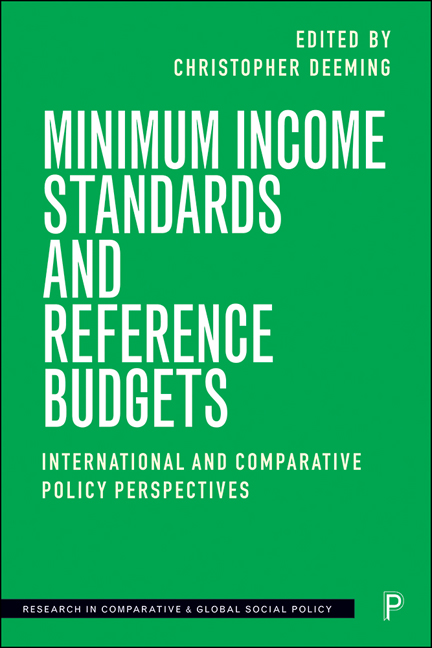19 - Adequate Income in Portugal: a Comparison of Two Estimation Methods
Published online by Cambridge University Press: 12 March 2021
Summary
Introduction
Income adequacy, considered as the sufficiency of disposable income to assure human dignity in a given society, is an old political issue. As stated in the Universal Declaration of Human Rights (1948), ‘everyone has the right to a standard of living adequate for the health and well-being of himself and of his family’ (emphasis added). In a market economy, where the satisfaction of material needs is very much dependent on consumption of goods and services obtained through the market, adequacy of living standard implies adequacy of disposable income to buy them. Adequate income as income required for human dignity is also in the European Pillar of Social Rights (2017) and is a matter of policy concern at the EU level (Deeming, 2017).
A normative income threshold, as an amount that provides people with an adequate level of resources to lead a decent and dignifying standard of living, is then necessary as a monetary reference for guaranteeing citizenship rights, to identify social needs for designing social policies and to evaluate the adequacy of social policies. The lack of normative content of the EU poverty threshold and the lack of an updated version of a normative income threshold in Portugal led to new research designed to construct reference budgets and to estimate adequate incomes (Pereirinha et al, 2020). The aim was to estimate an empirically based and socially accepted standard of adequate income for different family types, well adapted to the Portuguese reality, based upon a consensual budget development approach with sound scientific support that could inform debates on poverty in Portugal, as well as public policy decisions relating to social benefits, social minimums, minimum wage, fiscal measures and other spheres of governance. This research, which follows the Minimum Income Standard (MIS) approach (Bradshaw et al, 2008), will be referred to as MIS/raP here (rendimento adequado em Portugal).
The lack, at the EU level, of a common methodology that may support a normative income threshold, is also a matter of concern, which led the European Commission (EC) to propose the construction of reference budgets for all EU countries in order to ‘facilitate the Commission's task of monitoring the adequacy of income support in Europe’ (Goedemé et al, 2015: 7).
- Type
- Chapter
- Information
- Minimum Income Standards and Reference BudgetsInternational and Comparative Policy Perspectives, pp. 271 - 288Publisher: Bristol University PressPrint publication year: 2020



